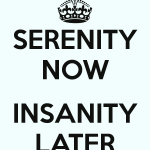
Women for Sobriety has a remarkable series of “13 Steps” to serve as an alternative to the 12 Steps of Alcoholics Anonymous. I have a life-threatening problem that once had me. I now take charge of my life and my … Continue reading

Women for Sobriety has a remarkable series of “13 Steps” to serve as an alternative to the 12 Steps of Alcoholics Anonymous. I have a life-threatening problem that once had me. I now take charge of my life and my … Continue reading

Here’s what some in the psychiatric professions have to say about Donald Trump: “Remarkably narcissistic,” said developmental psychologist and Harvard Graduate School professor Howard Gardner. Clinical psychologist Ben Michaelis echoed the sentiment, referring to Trump’s diagnosis as “Textbook [narcissistic] personality … Continue reading

University students in Massachusetts who were upset by an image of a Confederate flag sticker on another student’s laptop were offered counseling services at Framingham State University. The offer came after the university’s “chief diversity and inclusion officer,” Sean Huddleston, … Continue reading

Step Thirteen: Wrote my psychological declaration of independence. I no longer needed to rely on my feelings or others to make my decisions for me. Came to realize that my own mind, with its capacity to think and reason, was … Continue reading

Daniel Duffy served in Iraq from November 2006 to April 2007. He was part of the “surge” strategy President George W. Bush ordered to quell the insurgency. His basic mission was to help keep insurgents from getting a stronghold in … Continue reading

What is “shaming”? Do you engage in it? Is shaming done to you? How much power should shame and blame have? Shaming refers to the use of moral intimidation (name calling, humiliation) in place of facts, reason or logic when … Continue reading

What psychological purpose, if any, does belief in the supernatural serve? Clay Routledge Ph.D., researcher on the subject and author of “More Than Mortal” thinks it’s about meaning in life: My research lab studies how religious beliefs contribute to perceptions … Continue reading

We’ve all heard the phrase, “blaming the victim.” Normally, this expression applies when one party blames another — the actual victim — for something he or she did not cause. Things have become so backwards and upside down in our … Continue reading

Serenity now … Serenity how? When you experience an emotion, identify the emotion (to yourself). “I feel [insert emotion here].” But don’t blame the cause of the emotion on some person, situation or thing. In other words: Do not say, … Continue reading

Interesting fact: The head of the student counseling department at Boston College recently sent the following email to his faculty: “I have done a considerable amount of reading and research in recent months on the topic of resilience in college … Continue reading

Sometimes, when we feel upset about another person’s actions, we’re taking something personal that probably is not personal. A cardinal theme in cognitive therapy (what I do daily with people) is helping them challenge the idea that something is meant … Continue reading

“A message of hope.” I read this in headlines about the Pope’s recent visit. It made me think: How valuable is hope, really? I know that the absence of hope is a terrible thing. People become unhappy, full of despair … Continue reading